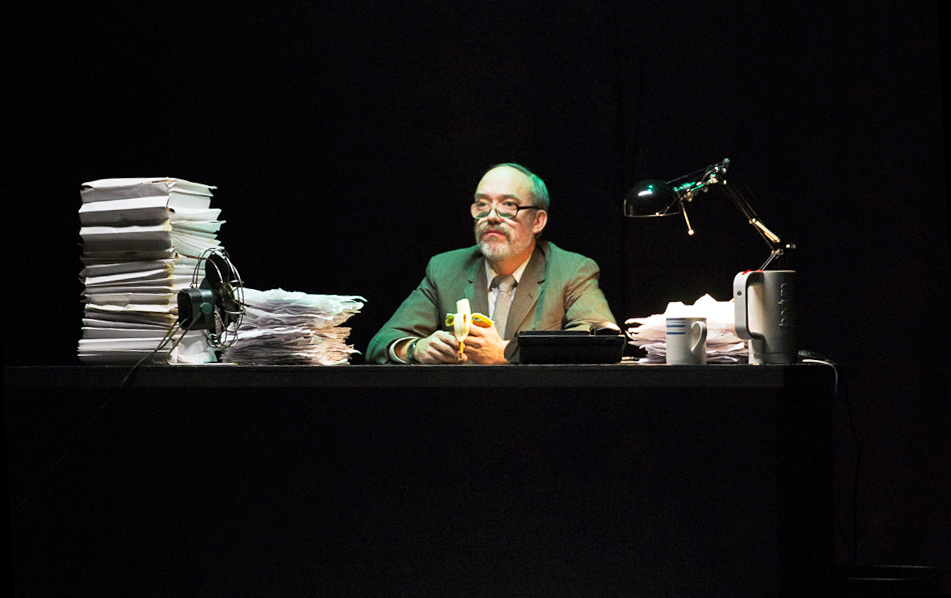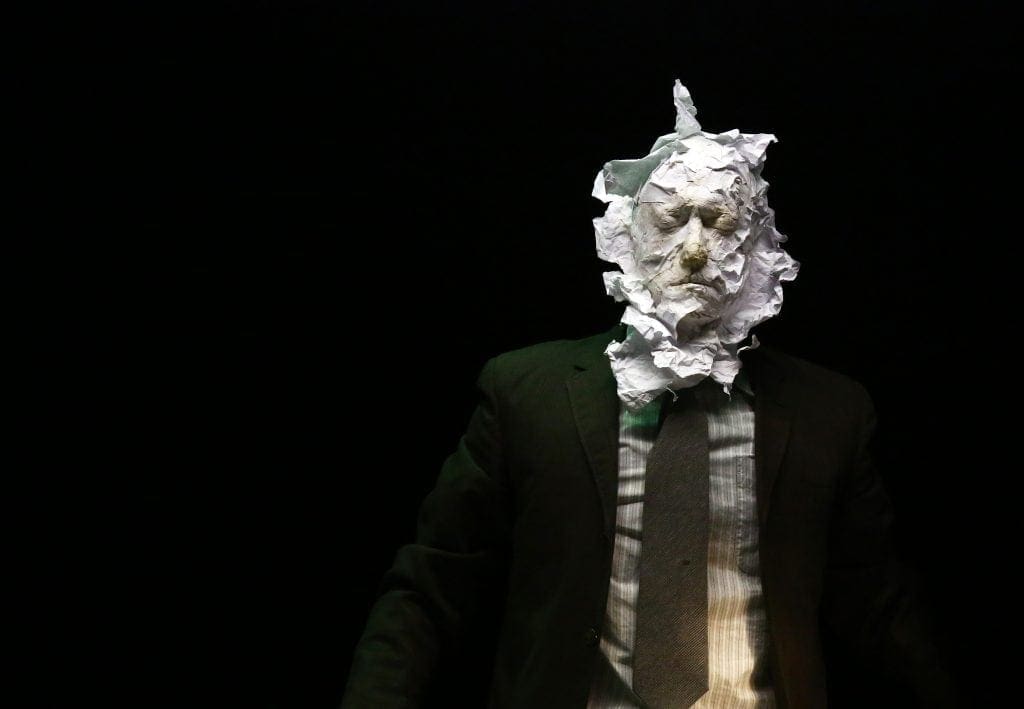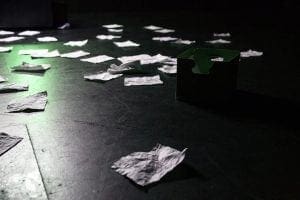Republished by kind permission from the FringeArts blog
 Trey Lyford’s distinct brand of physical theater has impressed Fringe Festival audiences in all wear bowlers (2005), Amnesia Curiosa (2006) and Elephant Room (2011). He returns to the Festival this year with The Accountant, a new interdisciplinary theater piece that follows the story of a middle-aged office clerk stuck in the tedium of life, fusing physical theater, humor, and illusion to create a “dreamscape of memory and loss.”
Trey Lyford’s distinct brand of physical theater has impressed Fringe Festival audiences in all wear bowlers (2005), Amnesia Curiosa (2006) and Elephant Room (2011). He returns to the Festival this year with The Accountant, a new interdisciplinary theater piece that follows the story of a middle-aged office clerk stuck in the tedium of life, fusing physical theater, humor, and illusion to create a “dreamscape of memory and loss.”
Lyford’s latest work will give audiences the chance to ruminate on their own lives, to think about the people who have come and gone, who have touched them in different ways. In witnessing the accountant coming to terms with the loss in his life, viewers are immersed in Lyford’s humor, slapstick, and illusion while reckoning with their own experiences. We asked Lyford about how the show has evolved since its conception and about the many performance forms that make up this innovative piece.
FringeArts: What was the initial inspiration for The Accountant?
Trey Lyford: The piece has been a long time coming . . . I originally thought of the show when I was temping in New York City in my early twenties. I was working at a pretty normal office, with glass-fronted offices that surrounded a pool of partitions for all the assistants in the middle. I was walking around delivering mail and one of the offices was completely dark and had an old man hunched over his desk. There was a lamp and he had stacks of paper surrounding him, floor to ceiling. It was right out of a Dickens novel and totally out of place in the modern office building. I have no idea what he did, or what his title was, but I felt like he had a secret doorway into another world under his desk. I have never been able to shake that image.
I came back to this idea (and also to one of my favorite Beckett pieces, Krapp’s Last Tape) when I started hitting middle age. This isolation really began to speak to me when my life was hit with five important deaths within two years. The people who were sick or dying and the people who they left behind all had to take stock, look back at their lives and put it all together somehow. I was in awe of that space. The moments of total clarity, beauty, and sorrow.
FringeArts: Why did you call this “The Accountant”?
Trey Lyford: It seemed to really say what it was for me. It tells you what kind of character is at the heart of the piece but it also references the idea that he is accounting for his life. Trying to find meaning and living in the memory of it all.
FringeArts: How has your vision for the show evolved?
Trey Lyford: Originally, the accountant at the center of the work was to be an old man in his 70s or 80s. I had the dream of getting cinema-level old age makeup to really transform. I wanted this to be a person at the end of his life. But once I did a few work-in-progress showings it became clear that the themes were just as relevant for someone middle-aged. In some ways it was even more full of pathos and comedy.
Also, once I started working with other performers, the show began to take a life of its own. Stories or poetic themes had to play themselves out differently. The work started as a one-man show, then became a three-person show when I began workshopping it in New York. When schedules and funding got in the way it went back to a one-person show. Now it’s arrived in the middle. 2.5 people, two adults and my 10-year-old daughter. It all feels right.
FringeArts: What are some of the performance “forms” you are playing with?
Trey Lyford: Well this is tricky because I use kind of whatever I can to play with rhythm and imagery. It has a fair amount of clowning in it, but the dark, simple kind — not so much the red nose circus kind. I am using humor and awkwardness to tell the story of a life buried by frustrations and lost hopes. I have often used the term “soft slapstick,” meaning the rhythms and the structure are similar to traditional bits, but there is a kind of existential void surrounding them. I still find that funny.
The second thing would be physical theater. I use all kinds of imagery and expression through physicality. This breaks the more naturalistic setting of an accountant’s office and brings it into the surreal. For me that lets us understand the mind of the accountant (more than his story). It’s about the state of memory and longing and the image-based work seems to feed that more.
There is a bit of magic in it. I’ve gotten to play with illusion a fair amount in my work with Geoff [Sobelle, Lyford’s collaborator on Fringe Festival shows all wear bowlers (2005), Amnesia Curiosa (2006) and Elephant Room (2011)]. We have always been interested in the way illusions can provide a sense of wonder and amazement in a moment when you are not relying on language alone. I try to use it sparingly, but it really helps me put the world in a dream logic — you know, when you have a dream and your sister’s face morphs into an ice cream cone, except simpler than that. A little magic can go a long way.
Lastly, I’ve been inspired by old vaudeville routines. They find their way into the piece in a delicate way, but I have always adored them for their full out we are just here to entertain you! There is something so needy and frantic about that, but also so nostalgic. I use found routines, and imagined ones, throughout the show.
FringeArts: What should the audience know coming into The Accountant?
Trey Lyford: I think there is room in the work to reflect on your own life and love. And so not only do I want people to see what this life is doing and going through, I’d love for them to hear and meditate on the silence in their own path. Where is the noise and how do we find the clearest moments to focus on. Much of this comes from my isolation after my mother’s death. I was looking for the essentials. And that is also what drew me to Beckett as a resource. He often only uses what is utterly necessary—and sometimes less! In Krapp’s Last Tape, Krapp also has the memory of losing his mother, and it is told so simply and with such precision. I hope people will leave seeing their lives in the same way.
—Introduction by Alyssa Kerper & questions by Christopher Munden
What: The Accountant
When: September 6 – 9, 2018
Where: Christ Church Neighborhood House, 20 North American Street
Cost: $15 – $29
Created by Trey Lyford


